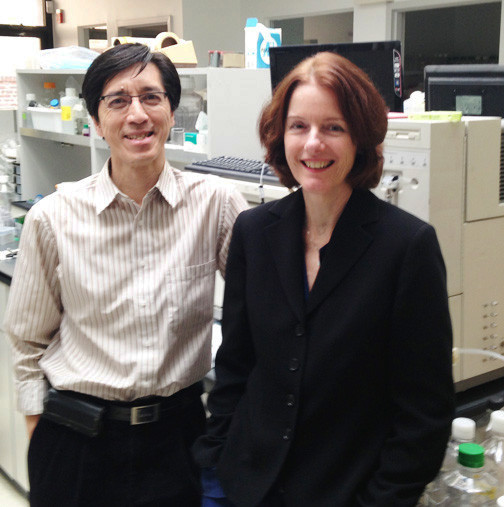ProThera creates strategic partnership to help launch its biologic into the clinic
Another emerging firm within Rhode Island’s maturing biomedical innovation industry cluster moves forward with an innovative, disruptive series of products
PROVIDENCE – There were any number of compelling story lines within the latest deal announced by an emerging company in the biomedical innovation industry cluster in Rhode Island, narratives that were not easily captured or translated in the Nov. 19 news release.
ProThera Biologics has entered into a strategic partnership agreement with ProMetic Life Sciences, a Quebec-based company, to develop and commercialize the human plasma-derived biologic known as Inter-alpha Inhibitor Proteins, or IAIP.
ProThera, founded in 2002, has pioneered the development of highly innovative products for the both the treatment and detection of severe inflammatory diseases, including sepsis and stroke, using IAIP.
The strategic partnership with ProMetic allows ProThera to have a source to manufacture the large quantities of blood-derived IAIP needed to move into clinic. In return, ProMetic has received an 11.25 percent equity stake in ProThera, with the potential to increase that stake to 22.5 percent following achievement of early-stage development milestones.
The goal, co-founder Yow-Pin Lim, M.D, Ph.D., told ConvergenceRI in an interview last week at the company’s facilities on Eddy Street, is to have the firm’s biologic products and detection tools centered around IAIP become the next FDA-approved protein derived from a blood fractionation process, of which there are now only 28.
Denice Spero, Ph.D., president and chief business officer at ProThera, described the potential upside for the company and its products in very positive terms. “The markets are huge for the indications that we are looking at; it’s an enormous market,” she told ConvergenceRI.
Richard Horan, managing senior director at the Slater Technology Fund, and the initial investor in ProThera through a “catalystic” $100,000 research grant, explained that in the case of the clinical indications that were being targeted with the firm’s biologic, IAIP.
“There are no competing therapeutics for systemic inflammation and for brain injuries, such as strokes,” Horan said. “We’re talking about targeting indications that are major unmet clinical needs. When you talk about potential patient populations and extrapolate, you get into billion-dollar blockbuster potential.”
Beyond the potential therapeutics, there is also the potential for IAIP to serve as a diagnostic tool – one where you can measure immune response to an inflammatory event in a rapid diagnostic test.
“Today, when you present with a fever, the tools that physicians use are really decades old to discern how severe your immune response is to this inflammatory event,” Spero said.
They can take your blood pressure, which is non-specific, she continued, “and then order a blood culture, which can take 48 hours plus.”
The new diagnostic test using IAIP being developed by ProThera, with support from SBIR grants from the National Institutes for Health, will take just five minutes, according to Spero and Lim.
Further, the potential diagnostic tool and biologic therapeutic using IAIP are seen as having a symbiotic relationship, and the plan is to develop them and market them together, as a package.
The journey goes on and on
For Lim, the journey to create ProThera and translate his ground-breaking innovative research and take it into the clinic has been long and arduous, stretching out more than a decade. Along the way, Lim has parlayed his research talent into attracting more than $8 million in federal and state grants to keep the venture going.
Horan called ProThera “a terrific example of one of the more compelling ways to build a biotech company.”
Horan complimented Lim’s frugality: “I believe that Yow-Pin is the Indonesian equivalent of the frugal Scotsman. He can stretch the value of a dollar like I’ve never seen before, and I say this because I used to work for a frugal Scotsman in the venture capital business.”
Secondly, Horan continued, “While Yow-Pin is a research scientist by training, with both an M.D. and a Ph.D., he’s demonstrated the rare ability to handle a broad spectrum of responsibilities.” In addition to being the co-founder and CEO and chief science officer, Horan said, “He’s also the chief cook and bottle washer.”
Lim demurred in response to Horan’s praise, quietly calling it “survival skills.”
Quantifying the value of research funding
Spero talked about the continuum in research funding that was necessary to keep small, emerging startup companies thriving.
“It’s a continuum,” she explained. “You need the research money, and the SBIRs are a fantastic bridge for us to start preparing for clinical studies.”
Then, at some point, Spero continued, “You need serious money, you need millions of dollars, and you’re going out and partnering and looking for venture capital.”
The initial effort to put small amounts money into research, such as the initial Slater investment, was positive, she added. “It creates a pipeline, it got us off the ground, and then we were able to transition to SBIRs.”
And then, Spero said, “We have the data and the numbers to be able to look for the serious money.”






